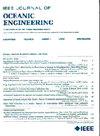Acoustic Camera-Based Adaptive Mosaicking Framework for Underwater Structures Inspection in Complex Marine Environments
IF 3.8
2区 工程技术
Q1 ENGINEERING, CIVIL
引用次数: 0
Abstract
This study considers the data processing for acoustic cameras and achieves the generation of high-quality acoustic panoramas through image mosaicking. Thanks to high-resolution imaging, acoustic cameras are increasingly popular in ocean engineering. However, their narrow detection field of view makes it challenging to intuitively perceive marine environments. Generating large panoramas through mosaicking is a good way to solve this problem. Due to limitations such as low resolution, low signal-to-noise ratio, weak textures, and nonlinear distortions in acoustic images, most classic mosaicking pipelines do not perform well. This study proposes an adaptive mosaicking framework for acoustic cameras that integrates image denoising, feature matching, and mosaicking modules. It can generate large-area panoramas from overlapping acoustic camera images without any assumptions regarding the scenes. The overall process consists of three main steps: first, introduce a self-supervised denoising strategy to preprocess acoustic images to effectively remove complex noise; second, use a detector-free paradigm to achieve feature matching between adjacent acoustic images. This paradigm matches dense pixels in the high-level structure of images rather than relying on isolated geometric features, addressing the matching challenges in weak-texture areas. Third, design a mosaicking approach based on matching results to generate acoustic panoramas. This framework has been verified experimentally, and the results show that it canrobustly and effectively mosaic acoustic images, providing a novel reference and solution for underwater structures inspection in complex marine environments.基于声学摄像机的自适应马赛克框架,用于复杂海洋环境中的水下结构检测
本研究考虑了声学相机的数据处理,并通过图像镶嵌生成高质量的声学全景图。得益于高分辨率成像技术,声学相机在海洋工程领域越来越受欢迎。然而,由于其探测视野狭窄,要直观地感知海洋环境具有挑战性。通过镶嵌生成大型全景图是解决这一问题的好方法。由于声学图像分辨率低、信噪比低、纹理弱和非线性失真等限制,大多数经典的镶嵌管道性能不佳。本研究为声学摄像机提出了一种自适应马赛克框架,它集成了图像去噪、特征匹配和马赛克模块。它可以从重叠的声学摄像机图像生成大面积全景图,而无需对场景做任何假设。整个过程包括三个主要步骤:首先,引入自监督去噪策略对声学图像进行预处理,以有效去除复杂噪声;其次,使用无检测器范式实现相邻声学图像之间的特征匹配。这种范式匹配图像高层结构中的密集像素,而不是依赖孤立的几何特征,从而解决了弱纹理区域的匹配难题。第三,根据匹配结果设计马赛克方法,生成声学全景图。该框架已经过实验验证,结果表明它能稳健有效地对声学图像进行镶嵌,为复杂海洋环境下的水下结构检测提供了新的参考和解决方案。
本文章由计算机程序翻译,如有差异,请以英文原文为准。
求助全文
约1分钟内获得全文
求助全文
来源期刊

IEEE Journal of Oceanic Engineering
工程技术-工程:大洋
CiteScore
9.60
自引率
12.20%
发文量
86
审稿时长
12 months
期刊介绍:
The IEEE Journal of Oceanic Engineering (ISSN 0364-9059) is the online-only quarterly publication of the IEEE Oceanic Engineering Society (IEEE OES). The scope of the Journal is the field of interest of the IEEE OES, which encompasses all aspects of science, engineering, and technology that address research, development, and operations pertaining to all bodies of water. This includes the creation of new capabilities and technologies from concept design through prototypes, testing, and operational systems to sense, explore, understand, develop, use, and responsibly manage natural resources.
 求助内容:
求助内容: 应助结果提醒方式:
应助结果提醒方式:


